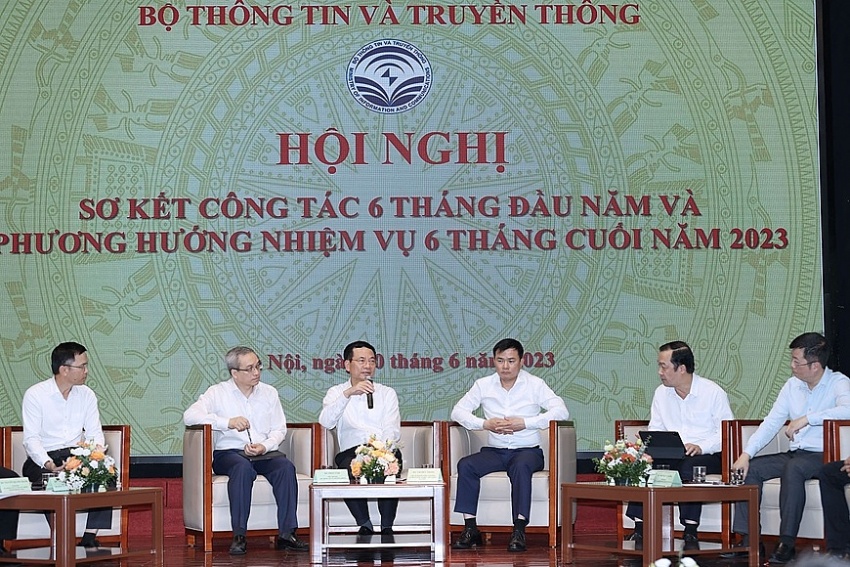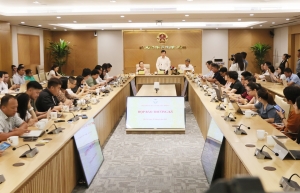Results and tasks thrashed out for ICT
Pham Duc Long, Deputy Minister of Information and Communications, said that the sector’s total revenue fell 8.66 per cent on-year and meeting 39.6 per cent of the yearly target. Its state budget collection is estimated at VND45.4 trillion ($1.9 billion) during the period, down 8.8 per cent from the same period last year and meeting 43.66 per cent of the same period last year.
 |
| Minister of Information and Communications Nguyen Manh Hung discussed with delegates at the first-half review meeting on June 30 |
The sector contributed VND389.8 trillion ($16.5 billion) to the country’s GDP, down 7.2 per cent on-year and meeting 41.24 per cent of the yearly target.
Between January and June, the ministry also focused on the legal works. Specifically, the draft Law on E-transactions was adopted at the fifth session of the National Assembly, creating a foundation for future growth.
The amended Law on Telecommunications was discussed at the fifth session of the National Assembly. The MIC is now working on the documents seeking for the amendment to the Law on Press 2026 and is expected to complete them by December.
The deputy minister also reviewed the performance in the industries and key tasks for the remaining months of the year.
The post industry
Revenue from post services is estimated at VND27.47 trillion ($1.19 billion), up 5.48 per cent from the same period last year and meeting 43.78 per cent of the yearly target.
The industry’s state budget collection was estimated at VND2.97 trillion ($129.13 million), up 4.2 per cent on-year and meeting 50.34 per cent of the yearly target.
Its total volume reached over 1.09 billion items, up 20 per cent on-year and fulfilling 45.74 per cent of yearly target.
However, slower economic growth in Vietnam and globally in the first half of year led to slower growth of the industry. Moreover, local Vietnamese post service providers face challenges when competing with foreign-invested ones.
Telecommunications
Revenue from telecoms services is estimated at VND74.47 trillion ($3.23 billion), up 7.9 per cent from the same period last year and meeting 53 per cent of the yearly target.
The industry’s state budget collection was estimated at VND19.34 trillion ($840.97 million), down 18.56 per cent on-year and meeting 39.47 per cent of the yearly target.
The number of households using optic cables rose to 77.1 per cent, up 5.7 per cent on-year and meeting 91.8 per cent of the yearly target.
The number of Internet users reached 78.59 per cent, surpassing the yearly target (76 per cent). And the threshold of fixed broadband subscribers reached 22.14 million, up 8 per cent on-year and fulfilling 88.6 per cent of the yearly target. And that of mobile broadband subscribers rose 5.67 per cent on-year to 85.7 million and fulfilling 95.2 per cent of the yearly target.
The rate of using IPv6 on the Internet in Vietnam reached 57.6 per cent, up 7.6 per cent on-year, some 1.6 times higher than the global average and 1.7 times higher than the ASEAN average.
National digital transformation
The accumulation of transactions made through the integrated national data sharing platform as of June 18 reached nearly 1.4 billion.
All ministries, agencies, and localities have issued and updated e-government architecture 2.0. All cities and provinces issued their resolution on digital transformation. And authorities at all levels issued a plan about digital transformation.
There are, however, some challenges. Some national databases have been unfinished, while some others are finished but not yet connected, shared, or operated effectively.
Moreover, the implementation of national digital platforms chaired by central ministries and agencies is still slow. It is necessary to be more drastic in leading and directing the implementation of national digital platforms.
The tasks for the industry in the second half of the year include completing a decree on the list of national databases; urging ministries and agencies and localities to announce the list and build the roadmap of connecting and sharing their database; taking measures to develop national digital platforms; and guiding relevant authorities in building digital a transformation plan in 2024 and others.
Digital government
The rate of fully qualified online public services reached 90.66 per cent of the yearly plan in 2023 (the 2023 target is 100 per cent). Currently, 80 out of 83 ministries and provinces have issued a list fully or partly online public services in line with Decree No.42/2022/ND-CP (Hanoi, Nam Dinh, and Dak Nong have not been issued).
However, the provision of online public services of state agencies is still not convenient. There is no policy to encourage people to access and use online public services. Therefore, the rate of administrative procedure documents submitted online remains low.
The sharing and opening of data by state agencies is still limited. National databases, specialised databases, and information systems from central to local levels have been slow to be deployed and put into operation on a national scale.
Information security
In the first six months of 2023, the Authority of Information Security recorded and handled 6,362 network attacks, down 4.2 per cent compared to the first six months of 2022.
It also dealt with 1,530 websites violating the law, and protected more than 2.7 million people from accessing fraudulent websites.
However, although specialised information security units of ministries, agencies and localities have advised, and guided regularly, many agencies, and organisations assigned to manage and operate the systems have not paid due attention to ensuring information security.
The key tasks for the upcoming months include crafting a directive on compliance with regulations and strengthening the assurance of information system security by level; cooperating with the International Telecommunication Union to provide information; evaluating the Global Cybersecurity Index in order to maintain Vietnam's international ranking of 25th; and implementing training programmes to improve knowledge and skills to ensure basic information security nationwide.
Digital economy
The number of small- and medium- sized enterprises (SMEs) approaching and participating in the SME programme is 849,291, reaching 106.1 per cent of the plan in 2023.
The number of SMEs using platforms related to the programme is over 135,300 enterprises, reaching 112.7 per cent of the plan.
The biggest difficulty for the management and acceleration of the digital economy and digital society is data scattered in many agencies and localities with high cost of collecting, high data latency, and data duplication.
Its key tasks in the second half are to promote the digital economy and digital society in a number of locations such as Haiphong, Nam Dinh, and Binh Dinh to learn from experience before doing it nationwide.
It will also build a database to monitor the development of the digital economy and digital society; build a forum to connect experts and scientists with individuals and organisations to combine the power of knowledge; organise the first National Forum for Digital Economy and Digital Society Development; and implement the programme to promote digital transformation of large enterprises and state corporations.
ICT industry
Revenue of the ICT industry is estimated at $62.82 billion, down 10.35 per cent on-year and meeting 38.87 per cent of the yearly plan. Hardware and electronics export turnover is estimated at $51.51 billion, down 9.56 per cent on-year and reaching 37.88 per cent of the yearly plan.
The number of digital technology enterprises is estimated at 72,000 enterprises, an increase of 6.7 per cent over the same period in 2022.
The ratio of Vietnam value/revenue in the ICT Industry sector is estimated at 29.68 per cent, up 1.78 per cent on-year and reaching 45.6 per cent of the yearly plan.
However, the ICT industry still faces legal challenges. After more than 15 years of implementation, the legal documents on the industry have revealed a number of limitations and fail to keep up with the development trends.
In the upcoming months, it will study, develop, and submit a proposal for building of the Law on Digital Technology Industry; a strategy for the digital tech industry to 2025, vision to 2030; and a strategy for the semiconductor chip industry to 2030 with a vision to 2035.
It will also seek approval to build dynamic zones for the IT industry, attracting investment in the production of electrical products, electronics, and AI in the provinces of Dong Nai, Binh Duong, and Ba Ria-Vung Tau.
There will also be the hosting of a National Forum on Developing Vietnamese Digital Technology Enterprises, which will take place in the south of the country later this year.
 | Enhanced customer experience with AI-powered tech With hyper-personalised digital banking apps, cashless transactions are becoming the new norm. We are seeing the emergence of digital financial advisors that are entirely capable of providing financial planning advice through automated algorithms. The rapid pace of digital transformation in the finance industry cannot be stopped. |
 | Data security – A top priority for digital economy development Businesses, policymakers, and experts gathered at the Vietnam Security Summit 2023 on June 2 to discuss the importance of information security and how to effectively utilise it in the context of digital transformation and global uncertainties. |
 | Vietnam opens a centre for digital transformation in the press Vietnam has debuted a centre to support the press to effectively implement the digital transformation goals as stated in the Strategy on Digital Transformation of the Press by 2025. |
 | Smart and steady with relocation to Vietnam More foreign corporations are relocating production to Vietnam to diversify their sup-ply chains, spurring the trend of digital transformation and smart manufacturing in Vietnam. Ryohei Oda, managing director of ABeam Consulting Vietnam, shared with Thanh Van his insight into this trend. |
 | Digital transformation can only improve value of journalism Digitalisation is crucial in journalism’s competitive landscape, fostering innovation and audience engagement. Associate Prof. Bui Chi Trung, vice dean at the School of Journalism and Communication, the University of Social Sciences and Humanities, discussed the transition and strategies for news organisations with VIR’s Le Luu. |
What the stars mean:
★ Poor ★ ★ Promising ★★★ Good ★★★★ Very good ★★★★★ Exceptional
Themes: Digital Transformation
- PM sets five key tasks to accelerate sci-tech development
- Ho Chi Minh City launches plan for innovation and digital transformation
- Dassault Systèmes and Nvidia to build platform powering virtual twins
- Sci-tech sector sees January revenue growth of 23 per cent
- Advanced semiconductor testing and packaging plant to become operational in 2027
Related Contents
Latest News
More News
- Ho Chi Minh City launches plan for innovation and digital transformation (February 25, 2026 | 09:00)
- Myriad risks ahead, but ones Vietnam can confront (February 20, 2026 | 15:02)
- Vietnam making the leap into AI and semiconductors (February 20, 2026 | 09:37)
- Funding must be activated for semiconductor success (February 20, 2026 | 09:20)
- Resilience as new benchmark for smarter infrastructure (February 19, 2026 | 20:35)
- A golden time to shine within ASEAN (February 19, 2026 | 20:22)
- Vietnam’s pivotal year for advancing sustainability (February 19, 2026 | 08:44)
- Strengthening the core role of industry and trade (February 19, 2026 | 08:35)
- Future orientations for healthcare improvements (February 19, 2026 | 08:29)
- Infrastructure orientations suitable for a new chapter (February 19, 2026 | 08:15)

 Tag:
Tag:























 Mobile Version
Mobile Version